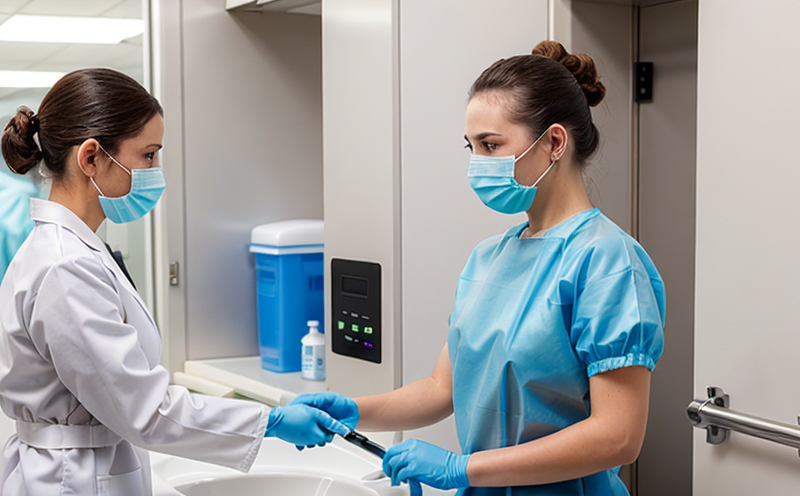BS 1425 Testing antibacterial efficiency of hygiene textiles
The British Standard BS 1425 is a widely recognized and internationally respected standard used to evaluate the antibacterial properties of hygiene textiles. This method ensures that products meet specific performance criteria, providing consumers with confidence in the efficacy and safety of textile-based antimicrobial protection.
BS 1425 involves placing test samples into a controlled environment where they are exposed to various bacterial contaminants under standardized conditions. The standard specifies a range of bacteria commonly found on human skin, including E. coli, Pseudomonas aeruginosa, and other relevant strains. Over time, the textiles' ability to inhibit bacterial growth is assessed by quantifying viable bacterial colonies.
The testing process begins with careful preparation of the textile samples. This includes washing them according to the manufacturer's recommendations or industry norms to simulate real-world conditions where the product might be used. Following this, samples are inoculated with a standardized suspension of test bacteria and incubated under controlled temperature and humidity levels to promote bacterial growth.
The results from BS 1425 testing play a crucial role in ensuring that hygiene textiles meet strict standards set forth by regulatory bodies. This not only enhances consumer trust but also supports brand reputation and compliance with international health regulations.
For instance, the textile industry has witnessed significant advancements in antimicrobial technology, leading to innovations such as silver-ion embedded fabrics or nanotechnology-based treatments designed specifically for high-touch surfaces like hospital gowns, bedding, and personal care products. By adhering to BS 1425 standards, manufacturers can validate these improvements scientifically.
Moreover, understanding the nuances of this testing process is essential for quality managers, compliance officers, R&D engineers, and procurement teams who must ensure that their products meet stringent hygiene requirements without compromising on comfort or aesthetics. Properly executed BS 1425 tests provide valuable insights into how effectively textiles can prevent microbial contamination, thereby safeguarding public health.
Accurate testing results also aid in product development by highlighting areas where further improvement could be made. For example, if certain types of bacteria are particularly resistant to a textile's antimicrobial properties during initial trials, manufacturers may need to explore alternative treatments or materials that offer better protection against these specific pathogens.
Why Choose This Test
Selecting BS 1425 testing for your hygiene textiles is an excellent choice due to its comprehensive approach and rigorous standards. Here are several compelling reasons why choosing this test can benefit your organization:
- Regulatory Compliance: Adhering to international standards helps ensure compliance with local regulations, thereby reducing the risk of non-conformance issues.
- Informed Decision-Making: The results from BS 1425 testing provide valuable data that can inform strategic decisions regarding product development and marketing strategies.
- Consumer Confidence: Demonstrating adherence to recognized standards instills trust among consumers, which is crucial for building brand loyalty.
- Competitive Advantage: By ensuring high-quality products through stringent testing procedures, companies can differentiate themselves in competitive markets.
The BS 1425 test not only meets current regulatory requirements but also sets a benchmark for future innovations within the hygiene textile sector. It allows businesses to stay ahead of emerging trends and challenges related to microbial resistance, thereby maintaining leadership positions in their respective fields.
Customer Impact and Satisfaction
The impact of BS 1425 testing extends beyond just regulatory compliance; it directly influences customer satisfaction by delivering high-quality products that meet or exceed expectations. When consumers purchase hygiene textiles tested according to BS 1425, they receive assurance about the product's antibacterial efficacy.
This assurance translates into enhanced confidence in using these products regularly, which is particularly important for sensitive populations such as hospital patients, elderly individuals, and those with compromised immune systems. For instance, hospitals can use textiles that have been rigorously tested to ensure they effectively reduce cross-contamination risks associated with bacterial infections.
Moreover, satisfied customers are more likely to recommend your products positively, fostering word-of-mouth marketing that can drive sales growth over time. Positive reviews and testimonials further reinforce the value proposition of BS 1425 testing by showcasing real-world benefits experienced by end-users.
In summary, implementing BS 1425 testing demonstrates a commitment to quality and safety, ultimately leading to greater customer satisfaction and loyalty across various sectors within the textile industry.
Use Cases and Application Examples
| Application Example | Description |
|---|---|
| Hospital Linens | BS 1425 testing ensures that hospital linens are capable of reducing the spread of pathogens, which is crucial in preventing outbreaks and infections. |
| Patient Gowns | The rigorous standards help guarantee that patient gowns maintain their antimicrobial properties throughout frequent washings without losing effectiveness. |
| Personal Care Products | This testing ensures that items like bandages and wound dressings remain free from harmful bacteria, promoting faster recovery for users. |
| Surgical Masks and Gowns | The tests validate the barrier function of these textiles against various microorganisms, ensuring optimal protection during medical procedures. |
| Textile-Fabricated Furniture | Testing furniture fabrics for antimicrobial properties helps create safer environments in public spaces like waiting rooms and offices. |
| Home Textiles | For products used in high-traffic areas of homes, such as door mats or bathroom rugs, BS 1425 testing guarantees their ability to combat germs effectively. |
| Sportswear and Fitness Clothing | Maintaining hygiene during physical activities is critical; thus, antimicrobial textiles tested according to this standard provide peace of mind for athletes. |
The above examples illustrate how BS 1425 testing applies across different sectors within the textile industry. Each application showcases the versatility and importance of adhering to these stringent standards when developing products aimed at enhancing health and hygiene.





